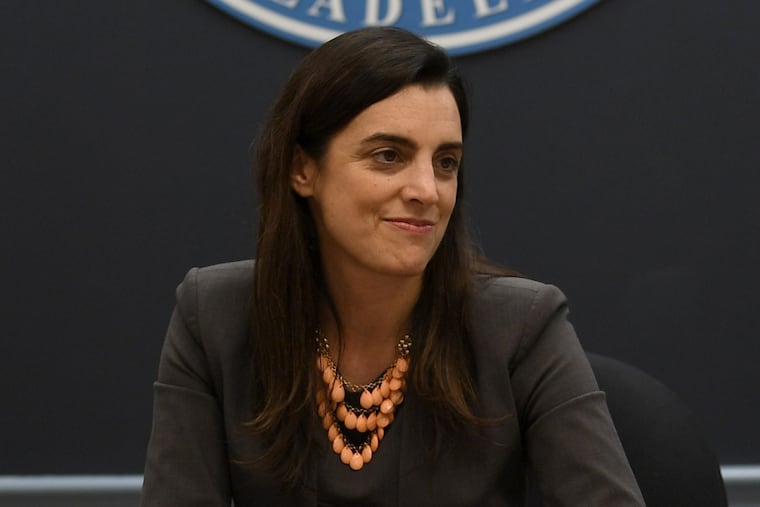Sloppy city bookkeeping ripe for abuse, Philly Controller says in audit
As of June of last year, Philadelphia had not reconciled seven accounts where millions in taxpayers dollars are transferred each year for several years, resulting in the now infamous missing $33 million, plus $924 million in accounting errors. The city also does not have enough auditors and lacks adequate technology to keep track of monies. And the Department of Revenue has lax rules on allowing employees to change individual tax accounts for up to $1 million.

Philadelphia's government has the worst accounting practices among the nation's 10 largest cities, with $924 million in bookkeeping errors alone last year, according to an audit released Tuesday by City Controller Rebecca Rhynhart.
That's on top of the now-infamous missing $33 million, the discrepancy between what the city's records say it has and what is in the bank — the result of a failure to reconcile the city's cash account over several years, Rhynhart said at a news conference.
In total, the controller's auditors found two "material weaknesses" and eight "significant deficiencies" in the fiscal 2017 books. The accounting terms refer to serious issues with the city's internal financial controls.
"This is a major problem and needs to be treated that way by the mayor and the finance director on down," Rhynhart told the Inquirer and Daily News. "If the City of Philadelphia is talking about tax increases, let's get our house in order."
By comparison, New York, Los Angeles, Chicago, and Houston did not have any problems in their 2017 audits. Phoenix had one deficiency and San Jose, Calif., had one material weakness and five significant deficiencies.
The news conference to release the audit findings was Rhynhart's first since she became the city's independently elected fiscal watchdog this year. A longtime aide to both Mayor Michael Nutter and Mayor Kenney, she won the office over three-term incumbent Alan Butkovitz.
But on Tuesday, she had harsh words for her former bosses — specifically Kenney and city finance director Rob Dubow.
"There is no concrete action plan. There's no plan to give any confidence that this won't be happening again next year," Rhynhart said, referring to the $924 million in accounting errors.
Rhynhart said the finance department had a history of sloppy record-keeping, noting her predecessor found similarly high number of errors in the books.
"What's been happening is they are depending on auditors from the controller's office to fix all these errors," Rhynhart said. "Finance's response has been and continues to be, 'Well, we will learn from that.'… The issue is that they should be preparing an accurate financial statement without the auditor doing it for them."
Dubow argued that catching and fixing errors is part of the controller's role.
"It's part of the normal review process," Dubow said. "It's part of the back and forth of the audit process."
Regardless, Dubow said that the city is taking the findings seriously, especially the $28 million that remains unaccounted for.
"We are putting a lot of resources into dealing with the issue — we hired an outside consultant, we hired additional staff," Dubow said. "We have a plan to correct the issue and to make sure it never happens again. It's going to take a little time because it's a big issue. But it is a high priority for us."
Dubow said the initial discrepancy was $40 million but city officials have been able to reconcile about $12 million so far. That amount had been entered incorrectly in the books or deposited into the wrong account.
Rhynhart faults the finance department's reduced staff and lack of technology. The department had 64 full-time employees in 2000 and now has 47. As for technology, the city prepares its financial statements with a combination of Excel spreadsheets, Word, and the discontinued Lotus 1-2-3 spreadsheet program.
On Monday, Kenney sent a letter to Rhynhart asking her to be part of a newly created Reconciliation Task Force, which the mayor said will make sure "taxpayer funds are used efficiently, and this matter is resolved." Kenney also said that the Office of Inspector General is looking into the unreconciled accounts.
Rhynhart said her office has also opened an investigation into the missing funds.
"The money should be found unless there is fraud going on," Rhynhart said. "There's no indication of whether it was just put into a wrong account, for example, and it was an innocent mistake or whether there has actually been any theft or fraud."
Another concern that Rhynhart highlighted was the practice of allowing Revenue Department staff to make changes to what is paid or owed in taxpayer accounts. Rank-and-file employees are authorized to adjust accounts worth up to $1 million; supervisors can change accounts worth up to $100 million.
Rhynhart said her office sampled 30 tax-account adjustments totaling nearly $140 million and found no wrongdoing. "Point is, this is ripe for abuse," she said.
In its written response to Rhynhart, the city said it will have an individual with no control over the tax account adjustment process regularly monitor daily adjustments.
Rhynhart said she hoped that the city starts taking internal controls more seriously.
"It's up to the mayor to say 'This is very urgent.' I haven't heard that yet," she said.